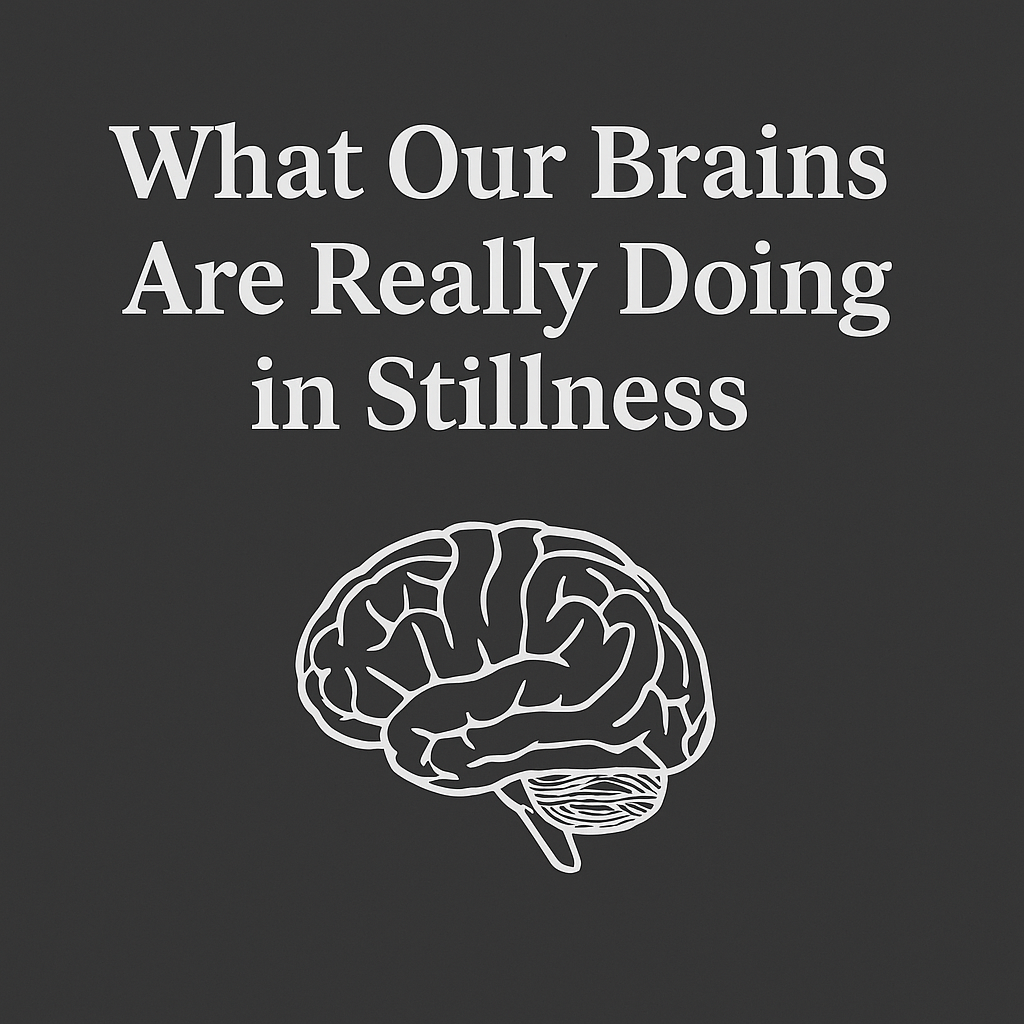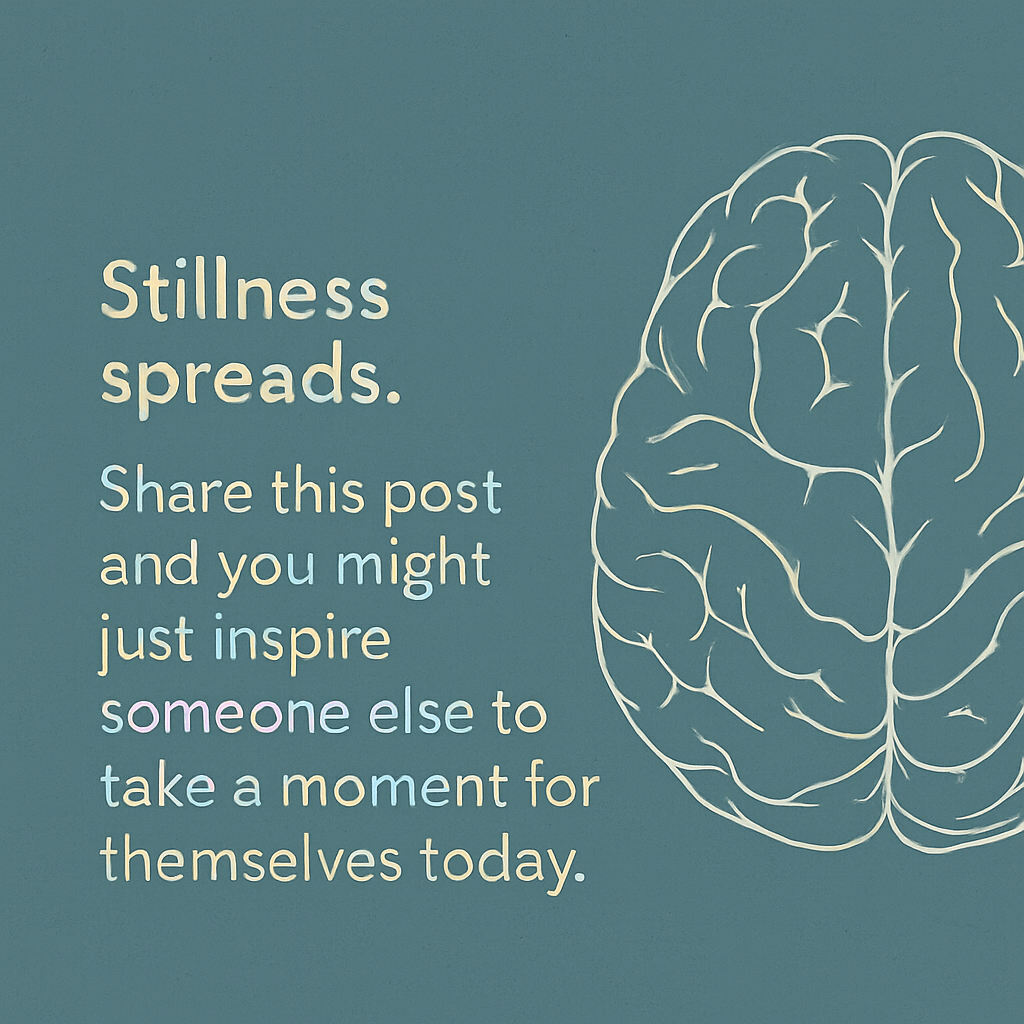"What Our Brains Are Really Doing in Stillness"
We live in a culture that measures value by activity. If we’re not moving, typing, scrolling, or ticking boxes, we assume we’re falling behind. But the truth is, stillness isn’t wasted time — it’s one of the most essential things we can give our minds.
Thanks for reading Brent’s Substack! Subscribe for free to receive new posts and support my work.
When you stop doing and allow yourself a moment of quiet, your brain doesn’t shut down. In fact, something remarkable happens. It switches gears.
1. The Default Mode Network wakes up.
This network in the brain lights up when you’re not focused on an immediate task. It’s where self-reflection, daydreaming, and big-picture thinking live. In stillness, your brain starts connecting dots between your past experiences and your future possibilities.
2. Your memories settle in.
The hippocampus uses this downtime to store away short-term memories into long-term storage. Sometimes the best way to “remember more” is to do nothing for a while.
3. Creativity sneaks in.
With the constant noise dialed down, your brain is free to make unexpected connections. That’s why your best ideas might arrive while you’re in the shower, taking a walk, or staring out the window.
4. Your emotions find balance.
Stillness helps quiet the amygdala, the part of the brain that sounds the alarm in stressful situations. It’s a natural reset button for your emotional state.
5. Clarity returns.
When you stop reacting to every ping, post, or email, you can see patterns and priorities more clearly. In the quiet, it’s easier to hear what truly matters.
Stillness isn’t the absence of work — it’s the foundation for meaningful work. It’s the pause between notes that makes the music, the space where your mind can breathe and rearrange what it’s learned.
You don’t have to schedule hours for it. Sometimes a few deep breaths between tasks, a quiet moment in the morning, or a short walk without your phone is enough.
Your brain will thank you. And your future self will too.
A Mental Shift Toward Peace
We often assume that expecting more from people will protect us, that holding a high standard will shield us from disappointment. But too often, those expectations weigh us down. They keep us frustrated, rigid, or disconnected. The pursuit of perfection, whether in others or in ourselves, can quietly erode our peace of mind.
Here’s a different path: Look for the good.
Not because people are flawless. But because you are choosing peace over pressure. Because you know that goodness doesn’t always arrive wrapped in perfection, it shows up in kindness, in effort, in small human gestures that say I’m trying.
Looking for the good isn’t a form of denial. It’s an act of clarity. It allows you to recognize the strengths in others without being blindsided by their weaknesses. And it softens the voice of your inner critic, too. When you extend grace outward, you tend to offer it inward as well.
Some days, your peace will depend less on what happens around you, and more on what you choose to see.
So pause. Breathe. Let go of the need to fix or judge or control.
And just look for the good.
One Flew Over the Cuckoo’s Nest: A Reflection on Order, Freedom, and the Mind
"Three geese in a flock, one flew east, one flew west, one flew over the cuckoo's nest."
—Ken Kesey
Ken Kesey’s One Flew Over the Cuckoo’s Nest is set in a psychiatric hospital in Oregon, but its reach extends far beyond those institutional walls. The novel uses the hospital as a stage to explore the tension between individual freedom and the systems that try to control it. It critiques the dehumanizing aspects of psychiatry, while celebrating the spirit of rebellion and self-expression.
The quote above—drawn from a traditional children’s rhyme—appears as the novel’s epigraph. At first glance, it seems simple or even nonsensical. But in context, it becomes a powerful symbol. The “one who flew over the cuckoo’s nest” represents the patient who dares to break free, the one who doesn’t conform, the spirit that resists being flattened by rules and routine.
Whether or not we’ve spent time in institutions ourselves, many of us know what it’s like to feel caged by expectation, by systems that don’t see the full person, or by labels that never quite capture who we are. This story, even years after it was written, reminds us that mental health is not just about diagnosis—it’s about dignity. It’s about remembering that behind every behavior is a human being with a story, a spirit, and a need for understanding.
I may not remember every chapter of the novel, but I remember the feeling it leaves behind: that the line between sanity and madness isn’t always as clear—or as fair—as we think. And sometimes, the one who flies over the nest is the one who sees most clearly of all.
.
The Power of Stopping Thought: Finding Presence Through Stillness →
The Power of Stopping Thought: Finding Presence Through Stillness
Being present in the moment isn’t always easy—especially when our minds are caught in the constant tug-of-war between yesterday’s regrets and tomorrow’s worries. We often find ourselves rehashing the past or rehearsing the future, rarely landing in the one place where life is actually happening: right now.
That’s where the simple but powerful act of intentionally pausing our thoughts comes in. By choosing to stop—or at least quiet—the stream of mental chatter, we make space for presence. This is the heart of mindfulness: not the absence of thought, but the redirection of attention toward the here and now.
When we stop chasing thoughts, we start noticing life.
Directing our attention to sensory experiences—the feel of your breath, the sound of rustling leaves, the warmth of sunlight on your skin—has a profound grounding effect. These physical sensations anchor us. They interrupt the mental loop and return us to a state of clarity, where we’re not lost in our heads but rooted in our bodies and surroundings.
This doesn’t require perfection or hours of meditation. It can start with just a moment: a breath, a pause, a choice to notice rather than overthink.
In those moments, we often discover something unexpected—not silence, but a deeper connection. A sense of calm. A renewed presence. And maybe, if only briefly, a kind of harmony that reminds us we don’t always need to figure everything out—we just need to be here.
Music Through Calm, Prevails - by Brent M. Jones →
Music through calm prevails Poem
Music and Mind
Music drifts freely—
notes floating without direction,
yet finding their way.
The mind opens,
and sound becomes connection.
Each note offers comfort,
settling into the body like breath.
A single tone enters,
spreads softly—
expanding through thought,
quieting what once stirred.
The music continues,
shaping new moments,
each note layering gently on the last.
Thoughts fall away.
Melody takes their place.
In sound,
the mind finds stillness—
and peace returns.
Early Signs and Symptoms of Alzheimer's and Dementia
10 Early Signs and Symptoms of Alzheimer's and Dementia
Memory loss that disrupts daily life. ...
Challenges in planning or solving problems. ...
Difficulty completing familiar tasks. ...
Confusion with time or place. ...
Trouble understanding visual images and spatial relationships. ...
New problems with words in speaking or writing.
Of the about 55 million people worldwide with dementia, 60% to 70% are estimated to have Alzheimer's disease. The early signs of the disease include forgetting recent events or conversations. Over time, it progresses to serious memory problems and loss of the ability to perform everyday tasks.
-Then What Happens? -
Holding Hands with a Tree Matters to Your Mental Health →
Holding Hands With a Tree Branch
By paying greater attention to your surroundings, you'll learn to appreciate all the sensory elements of the outdoors. This will help you decrease your anxiety levels, lessen stress and feelings of anger, and enhance your mental health.
"In every walk with nature, one receives far more than he seeks." - John Muir.
"What is the good of your stars and trees, your sunrise and the wind, if they do not enter into our daily lives?" - E.M. Forster
Dementia is not a specific disease but it is caused by Alzheimers Disease →
Alzheimer's disease type dementia is a specific brain disease that is a neurodegenerative disease that causes the loss of neurons in the brain, particularly in the cortex.
This damage to brain cells can disrupt processes vital to neurons and their networks, including communication, metabolism, and repair. As the disease progresses, symptoms become more severe and can include confusion, changes in behavior, and other challenges.
Dementia is not a specific disease but is a general term for the impaired ability to remember, think, or make decisions that interfere with everyday activities. It is marked by symptoms of dementia that worsen over time. The disease first affects the part of the brain associated with learning, leading to early symptoms such as changes in memory, thinking, and reasoning skills.
Vascular dementia (VaD) is a condition that affects the brain's ability to think, remember, and behave due to damaged blood vessels that disrupt blood flow and oxygen supply. It's the second most common type of dementia after Alzheimer's disease.
Vascular Dementia is another type of dementia, and when both are present, it is called Mixed Dementia.
Typical personality and behavior changes a person may see include getting upset, worried, and angry more easily. Acting depressed or not interested in things is also common.
Anendophasia, DNA, Dementia, and Mental Health Questions →
Anendophasia is a term for having no inner voice, which impacts verbal memory and rhyme recognition. It has been commonly assumed that inner speech—the experience of thought occurring in a natural language—is both universal and ubiquitous. Recent evidence, however, suggests that similar to other phenomenal experiences like visual imagery, the experience of inner speech varies between people, ranging from constant to non-existent. This information was reported in the Cognitive Science Society article “Not Everyone Has an Inner Voice: Behavioral Consequences of Anendophasia.” The authors were Johanne Nedergaard and Gary Lupyan. The inner voice is in the frontal motor cortex and Broca's area.
Writing about this as a layman with no formal training but some experience with memory loss, I find the idea that a strong inner voice could help with potential memory loss exciting.
Researchers at the University of Utah have made agroundbreaking discovery about the brain’s default mode network (DMN). They found that this network, in collaboration with other brain regions, plays a crucial role in fostering creative thought. By employing cutting-edge brain imaging techniques, they were able to monitor real-time brain activity during creative tasks, unveiling the intricate workings of the brain and inspiring new avenues of researchn.
Wikipedia reports that “in neuroscience, the default mode network (DMN), also known as the default network, default state network, or anatomically the medial frontoparietal network (M-FPN), is a large-scale brain network primarily composed of the dorsal medial prefrontal cortex, posterior cingulate cortex, precuneus, and angular gyrus. It is best known for being active when a person is not focused on the outside world, and the brain is at wakeful rest, such as during daydreaming and mind-wandering. It can also be active during detailed thoughts related to external task performance. Other times that the DMN is active include when the individual is thinking about others, thinking about themselves, remembering the past, and planning for the future.”
While this overview does not provide a definitive conclusion, it underscores the importance of understanding concepts like anendophasia* and the default mode network. These are not just intriguing aspects of neuroscience, but they also hold significant implications for our understanding of the human brain and cognition.
* The absence of inner speech or a lack of the experience of having an inner voice
Solitude is about Space to Exist →
For many, alone time is an excellent opportunity for self-reflection and self-discovery. It can also rejuvenate you by balancing your emotions and letting your body physically relax. This practice helps improve your well-being and relationships with others.
On the other hand, who are those “others”?
Lonely Quotes
"The eternal quest of the human being is to shatter his loneliness." - Norman Cousins
"Being lonely is like a storm with no rain, crying without tears." - Unknown
"Loneliness is the poverty of self; solitude is the richness of self." - May Sarton
"The soul that sees beauty may sometimes walk alone." - Johann Wolfgang von Goethe
"Loneliness is the human condition. No one is ever going to fill that space." - Janet Fitch
"To be alone is to be different; to be different is to be alone." - Suzanne Gordon
"Sometimes you need to take a break from everyone and spend time alone to experience, appreciate, and love yourself." - Robert Tew
"Sometimes it's better to be alone than to be in bad company." - Unknown
"Loneliness is the first thing which God's eye named, not good." - John Milton
"The most terrible poverty is loneliness and the feeling of being unloved." - Mother Teresa
"Sometimes you must stand alone to ensure you still can."
"Loneliness expresses the pain of being alone, and solitude expresses the glory of being alone." - Paul Tillich
"It's possible to be surrounded by people and still feel lonely, in your heart."
"The worst loneliness is not to be comfortable with yourself." - Mark Twain
"There is a certain strength in being alone, but there is a deep sadness too." "Loneliness is the human condition. Cultivate it. The way it tunnels into you allows your soul room to grow." - Janet Fitch
"To be alone is to be different; to be different is to be alone." - Suzanne Gordonse
"Sometimes, I feel so alone in this world, and it's strange because I'm not."
"The loneliest people are the kindest. The saddest people smile the brightest. The most damaged people are the wisest. All because they do not wish to see anyone else suffer like they do."
Lessons that Life Teaches about Alzheimer's →
Life brings many lessons, and that reality inspired me to write several books on personal development. Career development is also part of the overall process. Taking a hard look at yourself can bring many benefits and growth in both personal and career development. In doing this, you can see where making some changes is evident.
Looking closely at what skills match career choices similar to what you already have can reveal different titles for your skills that will make you look better. It can also reveal areas where more training could make a big difference.
Mental health is a state of well-being that affects how people think, feel, and act. You can periodically assess your mental health as you evaluate yourself for the interactions and opportunities in your daily life. Mental health includes emotional, psychological, and social well-being.
Emotional well-being
Psychological well-being
Social well-being
Resilience
Hope
Self-esteem
Mental health helps people:
Cope with stress
Realize their abilities
Learn and work well
Contribute to their community
Make healthy choices
Relate to others
Mental health can be influenced by and influence physical health. Factors that can contribute to mental health conditions include:
Biological factors, such as genes or brain chemistry
Life experiences, such as trauma or abuse
Some examples of mental health issues include Depression, Dementia, Substance use disorders, Affective disorders, and Anxiety disorders.
Some signs of poor mental health include:
Withdrawing from friends, family, and colleagues
Avoiding activities that are usually enjoyed
Sleeping too much or too little
Eating too much or too little
Feeling hopeless
Having consistently low energy
Using mood-altering substances more frequently
Displaying negative emotions
Being confused
Being unable to complete daily tasks
- These insight areas are ways we can learn more about ourselves. My book “Finding the Best Version of Ourselves: The Interview of Self” focused on looking at ourselves to find areas to improve, polish, and make ourselves more marketable. It would have been a plus if I had included ideas on personal mental health assessment in that edition of the book.

















